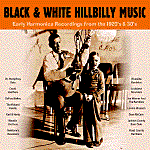| Black & White Hillbilly Music German | ||
![]() In
1931, at the height of the depression, The Woodie Brothers only sold 864
copies of Their record, but they knew they knew their reward lay in the
future: "Now I ran ole Satan Though door/And I´m gonna wear that starry
crown over there." (Sounds like Fall lync. In fact, it is a Fall lync-Stunned
Ed) In the 1990s the Woodies gain another honour by opening this gritty
compilation of guitar and harmonica-toting hillbillies. The album is subtitled
"Early Harmonica Recordings From The 1920s And 30s, and there are beautiful
photos of harmonicas packaged for the cowboy market, with names like Pioneer
and The Lone Star Rider. Expertly researched by Christoph Wagner, author
of books (sadly in German only) on the social history of the harmonica
and accordion.
In
1931, at the height of the depression, The Woodie Brothers only sold 864
copies of Their record, but they knew they knew their reward lay in the
future: "Now I ran ole Satan Though door/And I´m gonna wear that starry
crown over there." (Sounds like Fall lync. In fact, it is a Fall lync-Stunned
Ed) In the 1990s the Woodies gain another honour by opening this gritty
compilation of guitar and harmonica-toting hillbillies. The album is subtitled
"Early Harmonica Recordings From The 1920s And 30s, and there are beautiful
photos of harmonicas packaged for the cowboy market, with names like Pioneer
and The Lone Star Rider. Expertly researched by Christoph Wagner, author
of books (sadly in German only) on the social history of the harmonica
and accordion.
(The Wire)
 |
|
| Black
& White Hillbilly Music Early Harmonica Recordings CD-0226-E/U |
|
| Dr. Humphrey
Bate Crook Brothers Deford Bailey The Pickard Family Karl & Harty Woodie Brothers Nelstone's Hawaiians Riverside Ramblers Louisiana Rounders Joe Werner & The Ramblers Lonnie Glosson Dave McCarn |
|